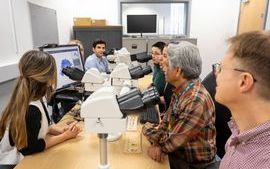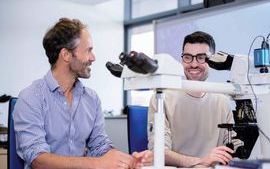- Published:
- 22 April 2025
- Author:
- Alistair Heath
- Read time:
- 3 Mins
Alistair Heath explains how an NHS clinical artificial intelligence fellowship can provide trainees with knowledge of modern digital technologies to enhance NHS processes.
My name is Alistair Heath. I am a specialty trainee in histopathology at Betsi Cadwaladr University Health Board and over the previous half year I have been given the opportunity to enrol in a 12-month NHS fellowship in clinical artificial intelligence (AI) alongside my histopathology training. The purpose of the fellowship is to teach interested healthcare workers the skills necessary to implement AI solutions into an existing process within the NHS. This group forms the third cohort of professionals to pursue the fellowship and the first opportunity for Wales-based professionals to enrol alongside members from England, Scotland and Northern Ireland. A genetics trainee from Cardiff and I are enrolled thanks to the funding provided by Health Education and Improvement Wales.
During a 2-day AI bootcamp hosted at Guy’s and St Thomas’ Hospital in London, I was introduced to the cohort of 28 other clinical fellows and the course faculty. The fellowship recruits from a range of healthcare disciplines including public health, physiotherapy, pharmacy, dentistry and medicine, with the goal of forming networks of AI experts across the NHS. In-person workshops take place in different venues throughout the year, often covering niche subjects such as information governance in AI, NHS procurement and commissioning, and evaluating the impact of AI within a healthcare setting.
For 2 days each week, I am responsible for facilitating the deployment of an AI algorithm into the department I work in, as well as furthering my understanding of AI. As a clinical fellow, I am expected to tailor my work and education to adhere to the fellowship curriculum. This curriculum is modelled to follow the life cycle of AI, including understanding its capabilities and writing a business case for AI, data procurement and preventing data bias, building and validation of algorithms, deployment and, finally, monitoring of the project.
The scope of the curriculum may sound open-ended – this is to adapt to the various projects, scales and stages that different fellows work in. My own project involves deploying an algorithm capable of screening clinically routine whole-slide images for signs of malignant tumours, which would otherwise wait in the laboratory’s routine backlog. My experience of implementing AI to date has largely been concerned with business case development and the legal framework for safe application of AI.
When I am not directly involved with project implementation, I am often completing online resources provided by the programme relevant to broader AI development. These resources include certification in data literacy fundamental to AI, as well as topics such as learning Python and its various modules, which are used by data engineers for health analytics. Although I may not utilise all the skills learnt as part of the course, I anticipate that some familiarity with data science will be vital for a future career incorporating artificial intelligence.
The project has not been without its challenges; as project leaders we have often found our progress slowed when interacting with existing clinical frameworks and organisations within the NHS. Scepticism towards AI implementation is still noticeable within key stakeholder groups. A key domain of the fellowship has been the gradual change of culture within the NHS to facilitate innovation in line with the recommendations of the Topol review. I do, however, believe that these difficulties demonstrate why such a training programme is necessary for innovation within the NHS.
As my project has reached its midpoint, I shall be working alongside my AI facilitator, Dr Muhammad Aslam, and the staff of Betsi Cadwaladr Cellular Pathology Department and Paige AI to begin the implementation and data collection stage of my service improvement, with the aim of eventually presenting my progress as a pioneer in medical AI.
Read next
Overcoming challenges in pathology training
22 April 2025
Reasonable adjustments for trainees
22 April 2025



